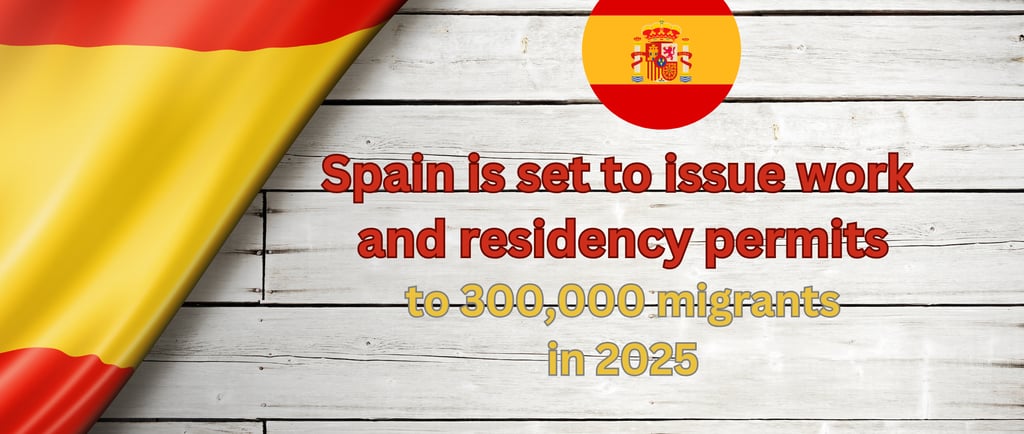Spain is set to issue work and residency permits to 300,000 migrants in 2025
Spain is rolling out a plan to bring in 300,000 undocumented migrants annually to tackle workforce gaps. This fresh approach, along with different work permit and visa options, is designed to boost the economy and provide legal opportunities for many people.


In a significant move to bolster its workforce and address labor shortages, Spain is set to issue work and residency permits to 300,000 migrants in 2025. This initiative reflects the country's commitment to integrating skilled workers from around the globe, facilitating not only economic growth but also cultural diversity. By welcoming a substantial number of migrants, Spain aims to tap into the potential of these individuals, fostering a more inclusive society while supporting various industries in need of labor. The plan is expected to enhance Spain's competitive edge in the global market, contributing to sustainable development and addressing demographic challenges. This proactive approach underscores Spain's recognition of the vital role that migration can play in shaping the future of its economy and communities.
Why Is Spain Making This Move?
With an aging population and a lack of skilled workers, Spain is stepping up to tackle these issues head-on. On November 20, 2024, Elma Saiz, the Migration Minister, unveiled a new initiative aimed at revitalizing the workforce and boosting the economy.
Benefits for Everyone
This new policy gives undocumented migrants a chance to legalize their status, reunite with family, and contribute to the economy through taxes and social security. Bringing in fresh talent can also help fill labor gaps in various industries, as noted by the Spanish Employment Service (SEPE).
Challenges and Opportunities
Bringing in such a large number of people will require thoughtful planning. There are language barriers, cultural differences, and logistical challenges to consider. However, Spain has a strong history of resilience and a welcoming attitude, making successful integration a real possibility.
What This Means for Migrants in Spain
This change opens up opportunities for businesses looking for skilled workers and for individuals wanting to start anew in Spain. Keep an eye out for more details on the application process and the specific requirements for residency and work permits.
Spain’s Work Permit and Visa Options
Spain has a range of work visas available for foreign professionals, covering everything from seasonal jobs to highly skilled roles and investment opportunities. If you're interested in working in Spain, check out the visa options available.
1. General Work Visa
This visa is for anyone who has a job offer from a Spanish company. It lasts for a year and can be renewed if they can’t find a local candidate to fill the position.
Perfect for those with a job offer from a Spanish employer.
The employer needs to show that no local candidate is available for the job.
Usually granted for one year, with the option to renew.
2. EU Blue Card
This is a visa for highly skilled professionals from outside the EU who have a job offer that meets certain salary requirements, making it easier to get permanent residency.
Tailored for skilled workers from non-EU countries.
Applicants need a job offer with a salary that meets the national minimum.
It offers a smoother route to permanent residency.
3. Seasonal Work Visa
Great for short-term jobs in sectors like agriculture or tourism. This visa is valid for six to nine months, depending on seasonal needs.
Perfect for temporary work in agriculture, tourism, and other seasonal fields.
Typically issued for a duration of six to nine months.
4. Self-Employment Visa
This is for freelancers or entrepreneurs looking to start their own business. You’ll need a solid business plan and proof of financial stability to get this visa.
For those wanting to launch a business in Spain as freelancers or entrepreneurs.
Applicants must provide a business plan and demonstrate financial stability.
5. Digital Nomad Visa
This visa is for non-residents who want to work remotely for a foreign employer while living in Spain, usually granted for a year.
Perfect for digital nomads working for companies outside of Spain.
Applicants need to show they are employed by a non-Spanish company and have financial stability.
Typically issued for one year, with the possibility of renewal if conditions are met.
6. Golden Visa
This is an investor visa designed for those who are ready to make significant investments in Spain’s economy, which can lead to residency and even citizenship for eligible investments.
It targets investors who are prepared to put a good amount of money into Spain.
Applicants need to invest in areas like real estate, businesses, or public debt.
It provides residency and the possibility of future citizenship.
What to Expect in the Coming Years
Spain’s move is a big step towards being more inclusive and revitalizing the economy. With the right integration strategies, these newcomers can become key players in the workforce. The government is looking to tackle labor shortages and enhance the economy while promoting a more diverse and welcoming society.
There might be some bumps along the way, but the potential for a brighter future for many migrants is clear. As Spain opens its doors, it’s not just about filling positions—it’s about offering people the opportunity to create a better life and contribute to a lively, expanding nation.
